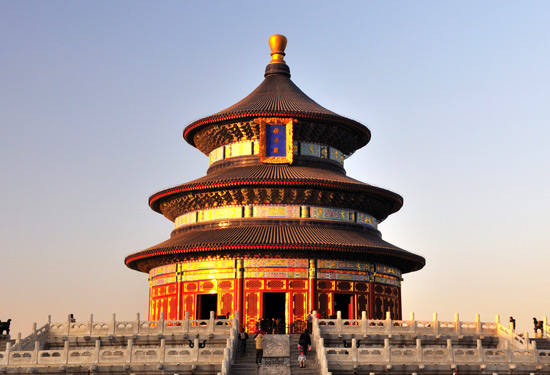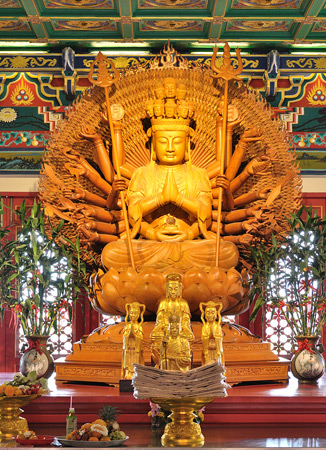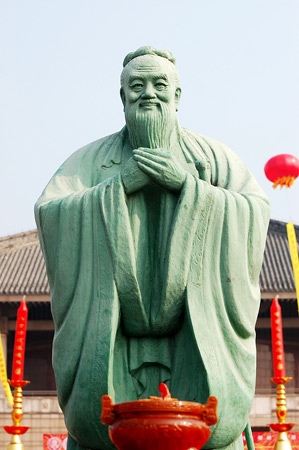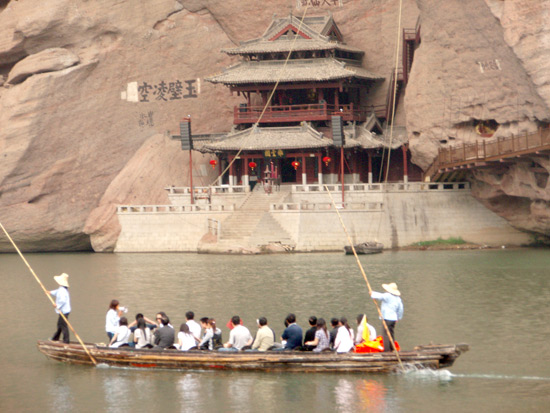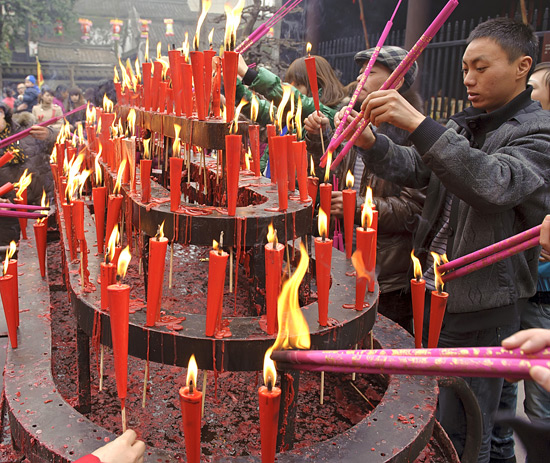Culture and Society: Religion Overview
Religions of the Country
China is officially an atheist country, but about a third of Chinese people practice traditional indigenous religious beliefs that contain elements of Taoism, Confucianism, Buddhism, and traditional ancestor worship. Buddhism is the largest organized religion in China despite a following of less than 10 percent of the population. Small numbers of Chinese follow Islam and Christianity, with the remainder of the population claiming no affiliation with any religion or identifying themselves as atheists.
Buddhism in China is divided into sects that include Mahayana Buddhism, Chan Buddhism (known as Zen in Japan), Theravada Buddhism, and Tibetan Buddhism.
Basic Tenets
The basic tenets of Buddhism are the "Four Noble Truths" enunciated by Siddhartha Gouthama who became the historical Buddha or "the enlightened one," in India in the sixth century B.C. These truths are that: Existence is dukkha (suffering); the cause of dukkha is trishna (craving, attachment); the state of nirvana is the end of all suffering (liberation, enlightenment, and the "extinction" of personality and personal desires); the way to end all dukkha and achieve nirvana is through the practice of the Eightfold Path (right view, right thought, right speech, right action, right livelihood, right effort, right awareness, and right concentration).
The Mahayana ("Great Vehicle") Buddhism practiced in China lays stress on Maha-karuna (the great compassion) and the altruistic quest of the Bodhisattva, the great being who seeks to attain the bodhicitta or the awakened mind to lead all sentient beings into nirvana or enlightenment, instead of seeking selfish enlightenment for one’s self.
Chan (Chinese for the Sanskrit term Dhyana, meaning meditation) is the Chinese form of Mahayana Buddhism brought to China (according to legend) by the Indian Buddhist monk Bodhidharma in the fifth century A.D. Bodhidharma claimed to have taught a form of Buddhism that was a "special transmission outside scriptures" that "did not rely on words." Chan emphasizes moment-to-moment awareness and direct and immediate perception into the nature of reality. Chan Buddhists rely upon the Mahayana texts Heart Sutra, Diamond Sutra, and the Lankavatara Sutra.
Taoism is a religion without any organized beliefs and creeds. Based on the teachings of Lao Tzu and his disciples, Taoism propounds a kind of "back to nature" ideal and way of life. The main elements of Tao are as follows. The "mysterious" Tao is the cause of the universe. Tao and its Te (virtue or power) permeate everything in the cosmos, including nature and human beings. Non-action (Wu Wei) and the detached observance of nature and oneself is the way to enlightenment. Everyone should cultivate the Tao through the nurturing of the three bodily energies (Jing, Ch’I, and Shen). In its popular form, it embraced alchemy and the search for the elixir of immortality. Taoists also adopted the study of the I Ching (Book of Changes), the classical text at the heart of Chinese tradition and culture, which is often used for the purpose of divination. The symbols used by Taoists to capture their philosophy include the interlocking yin and yang circle (representing the complementary forces of life), triangular flags tied to trees (as talismanic symbols), flags with the stars of the "Big Dipper" (because the North Pole is considered divine), and representations of phoenixes and dragons (symbolizing yin and yang, respectively).
Confucianism is a set of ethical guidelines laid down by the ancient Chinese sage K'ung Fu Tzu and his disciples. It emphasizes that one’s personal status is based on "merit" rather than one’s social position or wealth. Merit is gained by hard work and the virtues of honesty, sincerity, temperance, politeness, kindness, and respect for one’s elders, family, friends, and ancestors. Tibetan Buddhism is a distinct form of Buddhism that integrates four methods: Mahayana, Hinayana, Vajrayana, and AtiYoga . The main doctrine centers on
the enlightenment experience of the Buddha and the principal of the existence of oneness in two seemingly opposite principles. Some of the aspects of Tibetan Buddhism that set it apart from other forms of Buddhism include the belief that the Buddha can manifest himself in human form, that spiritual masters are capable of recovering lost or hidden ancient scriptures, and that the identities of some skandhas (lamas, or Buddhist spiritual teachers) are maintained through rebirth. The Dalai Lama, the head of all lamas, is cited as an example of this last belief. It is believed that oracular signs signify the birth or death of the Dalai Lama.
Tibetan Buddhism teaches a belief in a Pantheon of Buddhas (the spiritually enlightened ones), bodhisattvas (the compassionate ones who assist others in attaining Buddhahood), and Dharmapalas (mythical figures, many of whose origins can be traced to Hindu and Shamanist pantheons). Esoteric and tantric, Tibetan Buddhism includes the use of mantras (mystical incantation) and mandalas (ritualistic geometric designs), meditation, and, in rare instances, ritual sex between spiritual partners.
Spiritually Devout or Nominal
A significant majority of China’s population is atheist. Most Chinese are not very religious, and worship services see a rise in attendance only on special occasions such as festivals. A small number, however, are deeply religious and devoutly practice their religious beliefs. The country’s Buddhist population has a reputation of being devout and active in the practice of their beliefs. China’s rural population is relatively more religious than their urban counterparts.
Religious Conflict
China does experience certain social friction between various religious groups. These conflicts are both inter- and intra-religious. Tensions have cropped up between the Christians and Tibetan Buddhists, Christians and Muslims, registered and unregistered Christian groups, and between Christians and followers of indigenous traditional religious beliefs.
Secularism
China is an officially atheist country and the government is the driving secular force in the country.
Superstitions
China is home to many superstitions, although not many of them extend throughout the entire, vast nation. Chinese people tend to avoid bragging about good fortune, traditionally because the spirits might overhear and decide to take you down a peg.
One belief is that a spirit inhabits every broom. This is why hitting a person with a broom, particularly on the head, is believed to bring years of bad luck upon the victim. Sweeping the house is also avoided on New Year’s Day so that the sweeper does not sweep away good fortune. A number of other superstitious traditions concern themselves with the Chinese New Year. For instance, whatever one does on this day is seen as a portent of things to come for the rest of the year. Moreover, all windows are opened at the stroke of midnight on this day to allow the old year to go out and the new year to come in.
Eating a whole fish, a whole chicken (with head and legs intact), or uncut noodles is considered auspicious because these symbolize togetherness, abundance, longevity, and prosperity.
The practice of feng shui (literally "wind and water") is an ancient philosophy of architecture and interior design intended to increase harmony with one’s surroundings in order to ensure prosperity and well being. It involves building houses and arranging furniture according to guidelines meant to balance natural forces and avoid disharmony or bad luck.
Religious Clerics
Religious clerics do not command much authority among the general population in China. Their social status is low and they are generally not regarded as being either holy or wise. This is due in part to the attitude of the Chinese government, which has encouraged a sense of skepticism and suspicion against religious clerics. The elite or atheist segments of the population sometimes regard clerics as cheaters who take advantage of gullible people. Within individual religious communities, however, religious clerics are treated with respect.
China is home to numerous government-authorized training institutions for the five major religions. These include Catholic and Protestant seminaries, Islamic theological institutes, and Buddhist religious schools. There are also a number of religious training centers and secular universities that teach courses on theology.
State Regulations
Religious clerics are tightly regulated by the state. Students wishing to join theological courses are obliged to pass a government exam that tests their political and theological knowledge. Only licensed religious clerics of government-approved religious groups are allowed to practice. The government also limits the number of clergy permitted to join theological schools or colleges each year. Religious clerics are not paid by the state.
Religion and Public Life
Religion does not play a very important part in public life, and a majority of the Chinese is only nominally religious. Traditional religious beliefs and customs, however, do dominate many Chinese practices and are geared towards obtaining good fortune and warding off evil spirits. Religion comes to the fore only when there are rituals, festivals, or ceremonies to be celebrated. Traditional folk religion is sometimes deeply intertwined with Chinese culture, thereby giving rise to cultural festivals with religious overtones. For instance, the Chinese New Year, despite being a secular festival, is highly religious in practice.
Religious Holidays
China does not officially recognize or celebrate any religious holidays, although the week-long New Year’s Day holiday has long traditional religious roots. New Year’s offerings symbolize good luck and prosperity, and the explosion of fireworks is meant to ward off evil.
The most important religious ceremonies in Chinese culture are related to births, weddings, and deaths. However, while the celebration of these ceremonies in traditional religious styles continues in the rural areas, they have become increasingly secular in the urban centers.
That said, China’s long history of ancestor veneration still makes funerals very important events. Survivors make offerings to the deceased of toothbrushes, combs, towels, shoes, water, and "spirit money" for their use in the afterlife. The money, or "Hell notes," are sometimes burned as an offering to one’s ancestors, who are thought to act as "guardian angels" to their living relatives.
Government and Religion
The Chinese Constitution guarantees its citizens the right to practice the religion of their choice. This right, however, is not respected in practice by the government, which is formally atheist.
The formal separation between religion and the state is tenuous, because officially appointed religious leaders usually assist the government in various spiritual matters and are sometimes required to publicly voice their support for the government’s policies.
The government officially recognizes five major religions: Buddhism, Taoism, Islam, Catholicism, and Protestantism. The government, however, does permit registered religious groups to practice freely and, in some cases, works closely with them to accomplish social and religious goals.
Persecution
The Chinese government does persecute certain religions, with unregistered religious groups and cults in particular subject to sustained harassment. The government actively suppresses any religious cult deemed a threat to its authority. A prime example is the organization Falun Gong (literally "Practice of the Wheel of Law"), which advocates a set of meditation exercises to obtain salvation. It was declared a serious threat to social and political stability by the government and consequently banned, triggering severe repressive measures against the movement’s members. The government regularly cracks down on the activities of such groups; methods of persecution include indefinite detainment, physical abuse, torture, and sentencing to forced-labor camps. Moreover, places of worship belonging to unregistered religious groups are regularly demolished.
The murder of thousands of Tibetan Buddhist clergy and the demolition of thousands of Tibetan monasteries in the 1960s was also a major act of religious intolerance and is considered by much of the world to have been a crime against humanity. China is now attempting to erase this chapter of its recent past by promoting cultural tourism to Tibet.
There have been many documented cases of persecution of the Muslim Uighur minority in Western China. People in the Xinjiang region have complained that they are not allowed to wear beards or headscarves because these are signs of religious affiliation and children are not allowed to receive religious education, even at home.
Foreign missionaries are allowed into the country provided they confine their practice and duties to officially recognized religious organizations. Religious proselytizing is strictly forbidden, and so is the distribution of religious materials for proselytizing purposes. Religious items such as Bibles are available at official stores and can only be printed by a government-approved publishing house. Unregistered publishing houses are subject to fines and closure.
Religious Tolerance
There have been religious conflicts between China’s different religious groups, but, in general, the majority of the population is tolerant of religions. China’s dominant atheist population usually tends to ignore the activities of foreign missionaries and outside religious groups. Religious proselytizing is not accepted culturally.
Protocols for Foreigners
Foreigners are allowed to participate in the country’s religious activities and rituals. However, participation in the activities of unregistered or banned religious groups can lead to fines, imprisonment, or deportation.
Copyright © 1993—2025 World Trade Press. All rights reserved.

 China
China 